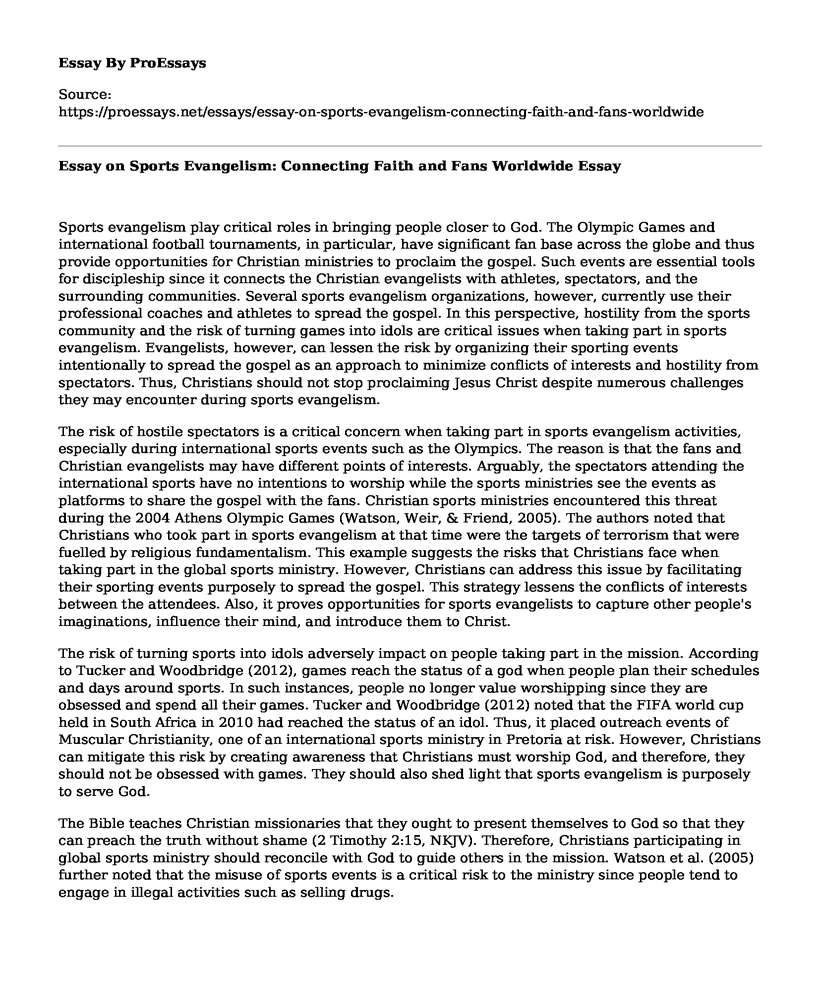Sports evangelism play critical roles in bringing people closer to God. The Olympic Games and international football tournaments, in particular, have significant fan base across the globe and thus provide opportunities for Christian ministries to proclaim the gospel. Such events are essential tools for discipleship since it connects the Christian evangelists with athletes, spectators, and the surrounding communities. Several sports evangelism organizations, however, currently use their professional coaches and athletes to spread the gospel. In this perspective, hostility from the sports community and the risk of turning games into idols are critical issues when taking part in sports evangelism. Evangelists, however, can lessen the risk by organizing their sporting events intentionally to spread the gospel as an approach to minimize conflicts of interests and hostility from spectators. Thus, Christians should not stop proclaiming Jesus Christ despite numerous challenges they may encounter during sports evangelism.
The risk of hostile spectators is a critical concern when taking part in sports evangelism activities, especially during international sports events such as the Olympics. The reason is that the fans and Christian evangelists may have different points of interests. Arguably, the spectators attending the international sports have no intentions to worship while the sports ministries see the events as platforms to share the gospel with the fans. Christian sports ministries encountered this threat during the 2004 Athens Olympic Games (Watson, Weir, & Friend, 2005). The authors noted that Christians who took part in sports evangelism at that time were the targets of terrorism that were fuelled by religious fundamentalism. This example suggests the risks that Christians face when taking part in the global sports ministry. However, Christians can address this issue by facilitating their sporting events purposely to spread the gospel. This strategy lessens the conflicts of interests between the attendees. Also, it proves opportunities for sports evangelists to capture other people's imaginations, influence their mind, and introduce them to Christ.
The risk of turning sports into idols adversely impact on people taking part in the mission. According to Tucker and Woodbridge (2012), games reach the status of a god when people plan their schedules and days around sports. In such instances, people no longer value worshipping since they are obsessed and spend all their games. Tucker and Woodbridge (2012) noted that the FIFA world cup held in South Africa in 2010 had reached the status of an idol. Thus, it placed outreach events of Muscular Christianity, one of an international sports ministry in Pretoria at risk. However, Christians can mitigate this risk by creating awareness that Christians must worship God, and therefore, they should not be obsessed with games. They should also shed light that sports evangelism is purposely to serve God.
The Bible teaches Christian missionaries that they ought to present themselves to God so that they can preach the truth without shame (2 Timothy 2:15, NKJV). Therefore, Christians participating in global sports ministry should reconcile with God to guide others in the mission. Watson et al. (2005) further noted that the misuse of sports events is a critical risk to the ministry since people tend to engage in illegal activities such as selling drugs.
Conclusion
In conclusion, global sports ministries are effective in promoting discipleship. However, its organizations and individuals face risks, which negatively impact on their outreach activities. Some of these challenges are hostility from the sporting community, the possibilities of making sports idols, and the misuse of the sports to promote illegal activities. Christians can address these issues by convening recreational and sporting events purposefully for evangelism. Also, they should enlighten the community that their actions are intentionally for evangelism.
References
Tucker, T., & Woodbridge, N. (2012). Motivational factors for a sports ministry: A case study of churches in Pretoria. HTS Theological Studies, 68(2). DOI: 10.4102/hts.v68i2.1199
Watson, N. J., Weir, S., & Friend, S. (2005). The development of muscular Christianity in Victorian Britain and beyond. Journal of religion and society, 7.
DOI: 10.1017/cbo97805116593312 Timothy 2:15. Bible Gateway passage: 2 Timothy 2:15 - New King James Version (NKJV). Retrieved July 16, 2019, from https://www.biblegateway.com/passage/?search=2+Timothy+2%3A15&version=NKJV/url/
Cite this page
Essay on Sports Evangelism: Connecting Faith and Fans Worldwide. (2023, Jan 26). Retrieved from https://proessays.net/essays/essay-on-sports-evangelism-connecting-faith-and-fans-worldwide
If you are the original author of this essay and no longer wish to have it published on the ProEssays website, please click below to request its removal:
- Stephen Hawking and God Essay
- Research Paper on God Existence
- Essay Sample on Pre-Season Football Training Program
- Exploring Christianity & Incorporating Other Faiths: The 'Law of Universe' - Essay Sample
- Buddhism: Over 520M Followers, 7% of Global Population - Essay Sample
- Essay Example on Hinduism: World's Oldest Religion, Free From Fanaticism
- A Sinner, Condemned, and Unclean but Forgiven Through Jesus Sacrifice - Essay Sample







